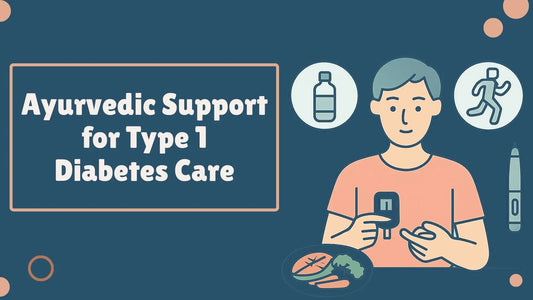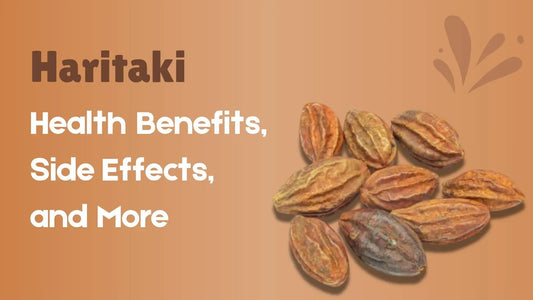
Ayurvedic Drinks and Teas That Help Control Blood Sugar
In people with diabetes, a healthy lifestyle plays a very important role in managing sugar spikes. Taking stress, skipping meals, working late nights, and consuming high-carb snacks are some of the reasons why you are experiencing those blood sugar swings again and again. But we have a natural solution that can help you keep your diabetes symptoms in control.
Ayurvedic Approach to Managing Diabetes Naturally
Diabetics have consumed some Ayurvedic drinks and herbal teas since ancient times due to their natural ability to balance sugar levels. We will be discussing about the same, how teas and drinks can help lower your blood sugar naturally and their benefits on your long-term health.
You must be wondering how Ayurveda can help you control diabetes better than allopathy. Well, the answer lies in nature’s secret drinks and tea recipes taken from pure and ayurvedic herbs. These are low-sugar and 0-calorie drinks and teas that help to balance blood sugar.
Ayurvedic Drinks to help lower blood sugar in Diabetics!
When the sugar level spikes, a lot of people panic; that’s because they are unaware of natural ways to bring sugar back into balance. Now you no longer have to, as we present to you some of the ayurvedic drinks that can help you next time when your sugar drops.
1. Fenugreek water

In Ayurveda, fenugreek is known for its various health benefits. It acts as a soluble fibre, which slows down the absorption of carbohydrates and sugar and helps to regulate blood sugar levels. It also helps reduce post-meal blood glucose spikes and controls HbA1c Levels in diabetics.
How to drink it?
Just soak a tablespoon of methi overnight in hot water, and drink it the next morning. Boil and strain the water before drinking.
2. Cinnamon water

Cinnamon is a popular kitchen item used in Indian households. But apart from it, it is a very popular herb known for its vivid benefits. It encourages the pancreas to release insulin which further helps with glucose processing in the body and stabilise blood sugar levels.
How to take it?
Boil a cup of water, now add a cinnamon stick to it or 1/2 teaspoon of ground cinnamon. Let it steep for 10-15 minutes, then strain and enjoy it warm or cooled.
3. Neem water

Ayurveda recognises neem as a rejuvenating and healing herb. It is helpful for diabetes as its anti-inflammatory and antiviral properties help diabetics to maintain a stable blood sugar level in diabetics.
How to drink it?
Bring 7-8 neem leaves to boil, strain them in a glass to drink.
4. Beet juice

Beet juice should be consumed to lower blood sugar as it reduces metabolic syndrome, a risk factor that causes spikes in diabetes symptoms. The compounds in beets also help control sudden blood sugar spikes and stabilise it immediately.
How to take it?
Peel the beetroot, cut into pieces. Now, to a blender, add beetroot; you can also add amla or pomegranate for better benefits. Now, add water as per requirement, blend, strain and drink it.
5. Karela Jamun Juice

Karela is very beneficial for people with diabetes. It contains compounds that mimic insulin activity, which help our cells to absorb sugar better.
Jamun, on the other hand, limits the sugar the intestines absorb from food. The combined benefit of these two herbs is vast, especially for diabetics who are looking to bring their blood sugar levels under control.
How to take it?
You can take this trio in juice form twice a day.
6. Turmeric milk

Turmeric has been used as a traditional medicine in Ayurveda, Unani and Siddha medicine and as a popular home remedy for various diseases. Turmeric comprises 2–8 % of curcumin (diferuloylmethane), which is useful for regulating sugar levels.
Studies show Turmeric milk has been effective in improving glycemic control in type 2 diabetes mellitus
How to take it?
Boil the milk and allow it to cool a bit. When it's slightly hot, add 1 teaspoon of turmeric and then stir it, serve it for drinking.
7. Amla juice
Amla juice has various nutrients such as Vitamin C, tannins and flavonoids. It helps boost the body’s metabolism and improves insulin sensitivity in people with diabetes. It also reduces HbA1c levels and brings down sugar levels naturally.
Studies show that amla also prevents the development of complications like diabetic neuropathy and diabetes-induced heart dysfunction in type-2 diabetic individuals.
How to take it?
Cut amlas into small pieces and then blend them with water. Now strain the juice to remove the pulp. For best results, take a tablespoon of juice mixed with bitter gourd juice daily.
List of Herbal teas that lower blood sugar
1. Tulsi tea

Tulsi is a medicinal plant that is greatly worshipped in India. Very less people know that it helps lower blood sugar levels and improve insulin secretion.
Additionally, it also has adaptogenic properties that help in managing stress, one of the key factors in reducing sugar levels.
2. Chamomile tea

Chamomile tea is viewed to be beneficial for people with type 2 diabetes. Being calorie-free and high in antioxidants, it is considered to be the best drink for diabetes patients.
In a Clinical Trial where T2DM patients were treated with chamomile tea after three daily meals. Drinking Chamomile tea was found to be beneficial as it reduced HbA1c concentration and serum insulin level.
3. Green tea

This tea is beneficial for diabetics as it lowers cellular damage, reduces inflammation and controls blood sugar spikes. It contains EGCG, which helps in naturally lowering blood sugar levels.
Furthermore, as per research, drinking 2-3 cups of green tea decreases long-term markers of diabetes (called haemoglobin A1C) by reducing our body’s insulin resistance per day.
4. Ginger tea

It contains polyphenols that lower blood sugar and manage diabetes symptoms well. Ginger may affect glycemic control in the body by inhibiting enzymes that are involved in the carbohydrate metabolism process.
It is also effective in reducing the risk of kidney damage and supporting immunity and insulin sensitivity.
5. Hibiscus Tea

Hibiscus has various medicinal properties. It’s tea helps lower both systolic and diastolic blood pressure. It has also been beneficial in maintaining heart health.
As per the National Institute of Diabetes and Digestive and Kidney Diseases, having diabetes means a greater risk of heart attack and stroke.
Therefore, drinking 8 ounces of hibiscus tea twice daily was found to reduce systolic blood pressure in individuals with diabetes in one month.
Conclusion
Many people affected by diabetes are still unaware of this Ayurvedic way of managing diabetes. Medications are important, but so is diet and your lifestyle. You can make your diet diabetes-friendly by taking precautions with the food you eat.
Risk arises not only from consuming sugary items, but there are other factors as well that cause sugar spikes. Therefore, to control it, we suggest various ayurvedic drinks and teas that are useful for their antioxidant and anti-inflammatory properties.
Some of the most beneficial ones that you can easily add to your diet are karela, jamun juice, amla juice and herbal teas such as green tea and chamomile tea. So, adapt to these lifestyle changes and feel the drop in your sugar level naturally.
References
- Kim, J., Noh, W., Kim, A., Choi, Y., & Kim, Y. S. (2023). The effect of fenugreek in type 2 diabetes and prediabetes: a systematic review and meta‑analysis of randomized controlled trials. International Journal of Molecular Sciences, 24(18), 13999. Available from: https://www.ncbi.nlm.nih.gov/pmc/articles/PMC10531284/
- Thirthalli, J., Naveen, G. H., Rao, M. G., Varambally, S., Christopher, R., & Gangadhar, B. N. Efficacy of turmeric as adjuvant therapy in type 2 diabetic patients. Available from: https://www.ncbi.nlm.nih.gov/pmc/articles/PMC4393385/
- Hoge, E. A., Chen, M. M., Orr, E., Metcalf, C. A., Fischer, L. E., Pollack, M. H., et al. The effects of green tea on obesity and type 2 diabetes. Available from: https://www.ncbi.nlm.nih.gov/pmc/articles/PMC3689013/
- Hartford Hospital. (n.d.). Study: 3 drinks help keep your blood sugar balanced. Available from: https://hartfordhospital.org/about-hh/news-center/news-detail?articleId=48273&publicid=395
- Tolahunase, M., Sagar, R., & Dada, R. Dietary ginger as a traditional therapy for blood sugar control in patients with type 2 diabetes mellitus. Available from: https://www.ncbi.nlm.nih.gov/pmc/articles/PMC6455977/
- Lavretsky, H., Epel, E. S., Siddarth, P., Nazarian, N., Cyr, N. S., Khalsa, D. S., et al. Green tea and type 2 diabetes. Available from: https://www.ncbi.nlm.nih.gov/pmc/articles/PMC5481694/
- Devi, B. A., Kamalakkannan, N., & Prince, P. S. (2023). Role of tulsi for preventing diabetes: a global perspective. Global Science Research Journal, 11(2), 1–7. Available from: https://www.globalscienceresearchjournals.org/articles/role-of-tulsi-for-preventing-diabetes-87589.html

Dr. Pooja Verma
Dr. Pooja Verma is a sincere General Ayurvedic Physician who holds a BAMS degree with an interest in healing people holistically. She makes tailor-made treatment plans for a patient based on the blend of Ayurveda and modern science. She specializes in the treatment of diabetes, joint pains, arthritis, piles, and age-related mobility issues.




